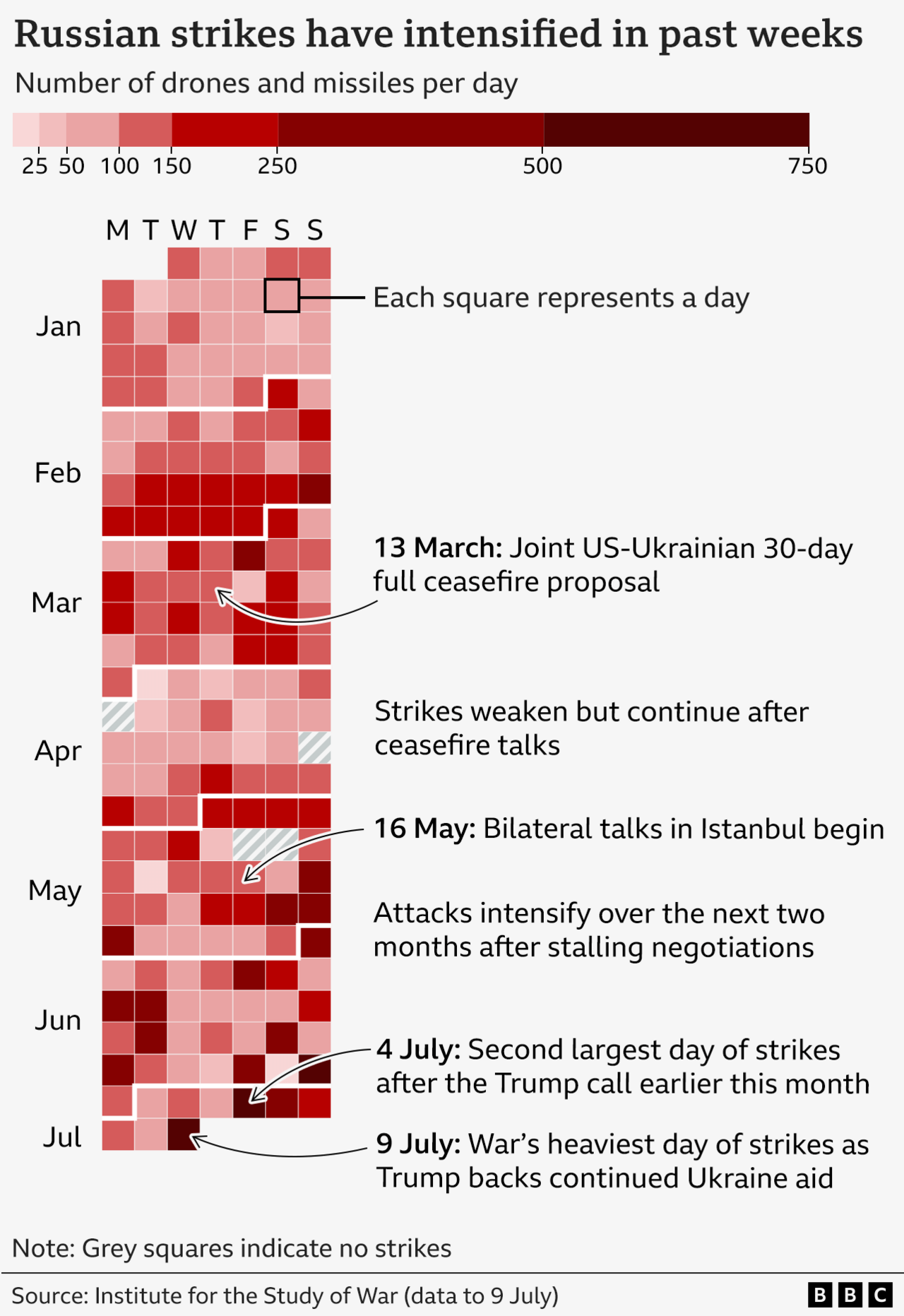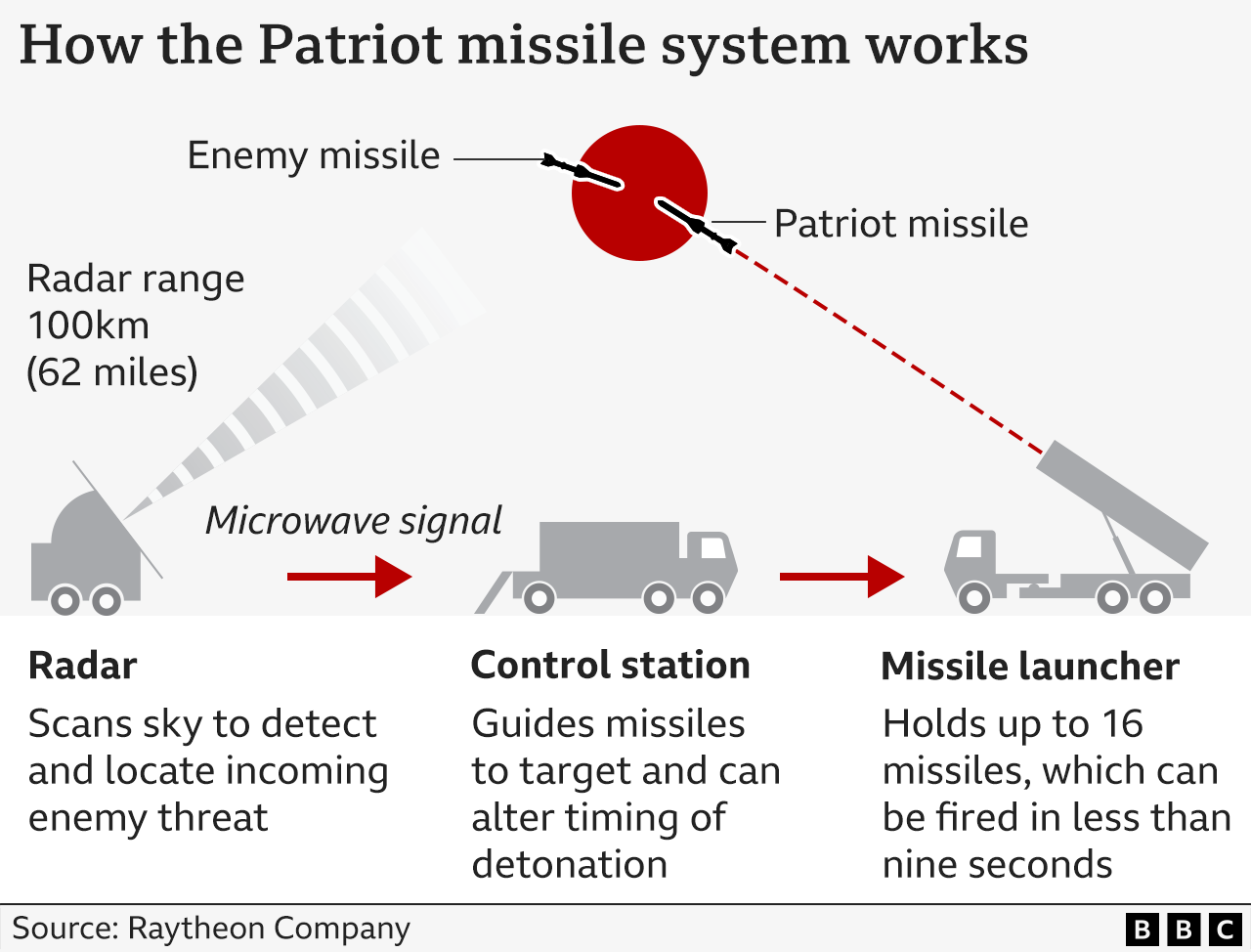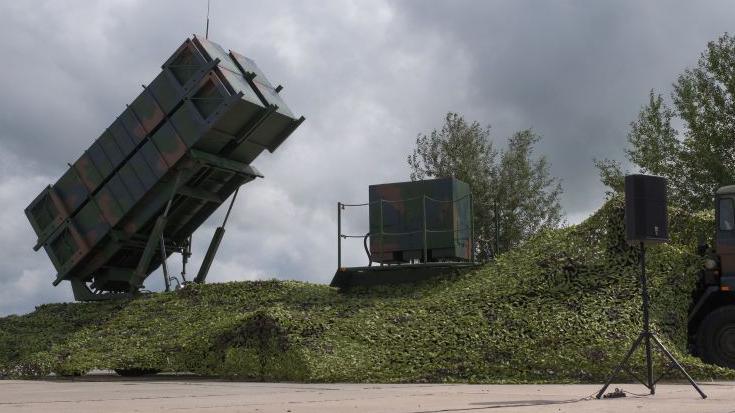US has resumed military supplies to Ukraine, Zelensky says

- Published
The US has resumed military supplies to Ukraine, President Volodymyr Zelensky has said, after Washington halted some shipments of critical arms last week.
US President Donald Trump told NBC News on Thursday that he had made a deal with Nato for the US to send Patriot air defence systems to Ukraine via the alliance, after a surge of Russian aerial attacks.
Zelensky had raised concerns about the impact the pause would have on Ukraine's defences, with supplies of Patriot systems and precision artillery shells among the armaments reported to have been stopped.
Russia has stepped up drone and missile attacks on Ukrainian cities in recent weeks, causing record civilian casualties.
In the wake of these attacks, Zelensky requested 10 Patriot systems. Patriot batteries detect and intercept oncoming missiles and are regarded as one of the world's best air defence systems.
The latest deal announced by Trump will see Nato buy Patriot systems from the US and then distribute them to Ukraine.
He said the alliance would "reimburse the full cost". Nato is funded through the contributions of its members, external, including the US.
Zelensky said in Rome on Thursday that Germany was ready to pay for two of the Patriots and Norway one, while other European partners were also prepared to help.
He touted "new European defence packages" in his Friday evening message, adding that Ukraine's military would be working with US envoy Keith Kellogg in the coming week.
US Secretary of State Marco Rubio told reporters on Friday that he had urged allies including Germany and Spain to hand over some of their existing Patriot batteries, as they could reach Ukraine faster.
"We have continued to encourage our Nato allies to provide those weapons... since they have them in their stocks, then we can enter into financial agreements... where they can purchase the replacements," he said.
The renewed efforts to supply air defences to Ukraine come in the wake of a barrage of deadly aerial attacks - which have shown signs of increasingly frustrating the US administration as it seeks a negotiated peace.
Ukraine was hit by a record 728 drones overnight on Tuesday, with the Ukrainian president warning that Russia wanted to increase that to 1,000.
June saw the highest monthly civilian casualties in Ukraine in three years, with 232 people killed and more than 1,300 injured, according to the UN.
Trump said on Tuesday that the US would send more weapons to Kyiv as "they're getting hit very hard now".
After a phone-call with Russia's Vladimir Putin last week, he said he was "not happy" that progress had not been made towards ending the war. He has since complained that Putin's "very nice" attitude turned out to be meaningless.
During his interview with NBC News, Trump said he would make a "major statement" on Russia on Monday, but did not say what it would be about.

The New York Times, quoting unnamed US officials, reports that a Patriot battery formerly based in Israel will be sent to Ukraine after refurbishment in the US.
Negotiations over the Israeli battery have been going on for some time. Last month, a senior official in Kyiv said it had already been sent to the US, but that Ukraine was still waiting to receive it.
Patriot air defence batteries, and the interceptor missiles they fire, play a critical role in defending Ukrainian cities, civilian and military infrastructure, from Russian cruise and ballistic missile attacks.
Alongside Soviet-era S-300 surface-to-air missiles and Western-made Nasams (National Advanced Surface-to-Air Missile System), the Patriots help Ukraine maintain what the military often calls a "layered defence".
With its advanced radar and tracking and high interception rate, the Patriot is a highly effective weapon without which Ukraine would struggle to protect itself against Moscow's relentless bombardments.
But it is also eye-wateringly expensive, with a single battery, including missiles, worth around $1bn (£740m). This helps explain why Western countries that operate Patriot systems have been reluctant to part with them.
Ukrainian troops already know how to use them.
The first two Western-supplied batteries arrived in April 2023, after months of pleading from Kyiv. The exact number of systems currently in use is a closely guarded secret.
But each additional battery allows Ukraine to put more cities and key facilities, including military bases and power stations, under the system's protective umbrella.
Ukraine is a huge country. It will never be able to protect everything – or everyone. But with Russian aerial attacks increasing in frequency and size, Kyiv's Western allies seem to recognise the urgency of the need.


A Patriot system received by Ukraine is seen in 2024
Since re-entering the White House in January, Trump has pushed to scale back US support for Ukraine.
The US was the biggest source of military aid to Ukraine between the start of 2022 and the end of 2024, giving $69bn (£54.6bn) in that time period, according to German think tank the Kiel Institute.
Trump has also pressed Nato allies to pledge more of their GDP to the security alliance. Last year, all European Nato members pledged to spend 2% of GDP on defence.
Russia launched a full-scale invasion of Ukraine in February 2022 and currently controls around a fifth of Ukrainian territory.
Rubio told reporters that he and Russian Foreign Minister Sergei Lavrov had a "frank" conversation on the sidelines of a meeting in Malaysia on Thursday.
Rubio echoed Trump's "frustration at the lack of progress at peace talks", including "disappointment that there has not been more flexibility on the Russian side to bring about an end to this conflict".
He said the two had shared some new ideas about how the conflict could conclude, which he would take back to Trump.
Rubio declined to elaborate on what Trump said would be a "major" announcement about Russia on Monday.
